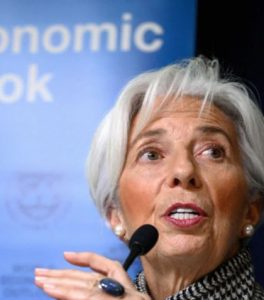Women, youth in the developing world worst hit by pandemic – IMF report
Young people, women and workers in low paid or casual jobs have been worst hit by the economic impact of the COVID-19 pandemic, according to a new report from the International Monetary Fund (IMF).
And 95 million more people have fallen in to poverty as a result of the pandemic.
 The World Economic Outlook report also says that, among countries, developing nations and those relying on tourism and commodity exports will find economic recovery hardest to achieve.
The World Economic Outlook report also says that, among countries, developing nations and those relying on tourism and commodity exports will find economic recovery hardest to achieve.
“Youth, women, workers with relatively lower educational attainment, and the informally employed havegenerally been hit hardest,” the report says.
“Income inequality is likely to increase significantly because of the pandemic. Close to 95 million more people are estimated to have fallen below the threshold of extreme poverty in 2020 compared with pre-pandemic projections.
“Moreover, learning losses have been more severe in low-income and developing countries, which have found it harder to cope with school closures, and especially for girls and students from low-income households.
“Unequal setbacks to schooling could further amplify income inequality,” the report says.
The report says global economic prospects remain highly uncertain one year into the pandemic and new virus strains the rising human toll continue to raise concerns even as growing vaccine coverage boosts economic confidence.
It says economic recoveries are differing across countries and sectors, reflecting a variety of pandemic-related disruptions and the extent of government policy support.
“Global growth is projected at 6 percent in 2021, moderating to 4.4 percent in 2022. The projections for 2021 and 2022 are stronger than in the October 2020 WEO,” the report said.
“The upward revision reflects additional fiscal support in a few large economies, the anticipated vaccine-powered recovery in the second half of 2021, and continued adaptation of economic activity to subdued mobility,” it said.
But the report says the effects of the pandemic are not as bad as originally predicted.
“The contraction for 2020 is 1.1 percentage points smaller than projected in the October 2020 World Economic Outlook (WEO), reflecting the higher-than-expected growth outturns in the second half of the year for most regions after lockdowns were eased and as economies adapted to new ways of working,” the report said.
“Thanks to unprecedented policy response, the COVID-19 recession is likely to leave smaller scars than the 2008 global financial crisis,” it said.
“However, emerging market economies and low-income developing countries have been hit harder and are expected to suffer more significant medium-term losses.”
The report says that losses have been particularly large for countries that rely on tourism and commodity exports and for those with limited ability to respond.
“Many of these countries entered the crisis in a precarious fiscal situation and with less capacity to mount major health care policy responses or support livelihoods,” it says.
The IMF report says future economic recovery will depend on how the health crisis pans out, including whether the new COVID-19 strains will be vaccine resistant.
Other related factors are the effectiveness of policy actions to limit long-term economic damage, the evolution of financial conditions and commodity prices and the adjustment capacity of the economy.
“In certain countries, policy support and lack of spending opportunities have led to large increases in savings that could be unleashed very quickly should uncertainty dissipate,” the report said.
“At the same time, it is unclear how much of these savings will be spent, given the deterioration of many firms’ and households’ balance sheets (particularly among those with a high propensity to consume out of income) and the expiration of loan repayment moratoria,” it said.
The report recommends policymakers prioritise “policies that would be prudent, regardless of the state of the world that prevails—for instance, strengthening social protection with wider eligibility for unemployment insurance to cover the self-employed and informally employed; ensuring adequate resources for health care, early childhood development programs, education, and vocational training; and investing in green infrastructure to hasten the transition to lower carbon dependence”.
“Where elevated debt levels limit scope for action, effort should also be directed at creating space through increased revenue collection (fewer breaks, better coverage of registries, and switching to well-designed value-added taxes), greater tax progressivity, and by reducing wasteful subsidies,” the report said.
Read the full report here: World Economic Outlook, April 2021: Managing Divergent Recoveries (imf.org)












